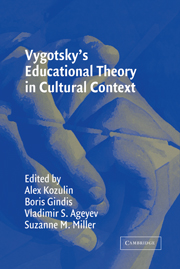Book contents
- Frontmatter
- Contents
- List of Contributors
- Series Foreword
- Introduction: Sociocultural Theory and Education: Students, Teachers, and Knowledge
- PART I CONCEPTS AND PARADIGMS
- PART II DEVELOPMENT AND LEARNING
- PART III SOCIOCULTURAL THEORY APPLICATION IN THE CLASSROOM
- 11 Cultural–Historical Theory and Mathematics Education
- 12 Sociocultural Theory and the Practice of Teaching Historical Concepts
- 13 Formation of Learning Activity and Theoretical Thinking in Science Teaching
- 14 How Literature Discussion Shapes Thinking
- 15 Beyond Cognition
- PART IV DIVERSE LEARNERS AND CONTEXTS OF EDUCATION
- Author Index
- Subject Index
- Titles in the series
- References
11 - Cultural–Historical Theory and Mathematics Education
Published online by Cambridge University Press: 05 June 2012
- Frontmatter
- Contents
- List of Contributors
- Series Foreword
- Introduction: Sociocultural Theory and Education: Students, Teachers, and Knowledge
- PART I CONCEPTS AND PARADIGMS
- PART II DEVELOPMENT AND LEARNING
- PART III SOCIOCULTURAL THEORY APPLICATION IN THE CLASSROOM
- 11 Cultural–Historical Theory and Mathematics Education
- 12 Sociocultural Theory and the Practice of Teaching Historical Concepts
- 13 Formation of Learning Activity and Theoretical Thinking in Science Teaching
- 14 How Literature Discussion Shapes Thinking
- 15 Beyond Cognition
- PART IV DIVERSE LEARNERS AND CONTEXTS OF EDUCATION
- Author Index
- Subject Index
- Titles in the series
- References
Summary
Mathematics education in the United States is currently undergoing an attempt at reform. In this chapter an alternative in the form of a Vygotskian-based approach to mathematics pedagogy is explored. While embracing teaching methods similar to those advocated within the reform movement, the Vygotskian-based curriculum, in its genetic analysis of mathematics concepts, their derivation from measurement, and representation by schematic modeling, differs substantively from both historical and current U.S. reform efforts. The teaching and curricular similarities and differences of reform practices and Vygotskian-based pedagogy reflect their respective grounding in divergent theoretical perspectives – the former in constructivism and the latter in cultural–historical theory. Here the cultural–historical approach is addressed, and some of the effects of these two pedagogical approaches on the adequacy of mathematical understanding is explored. It is necessary, however, to begin with a summary consideration of the antecedents of the current reform effort.
Mathematics education throughout the past century has come under the dominance of several learning paradigms. First was the early period of behaviorist pedagogy, succeeded by the formalism of the “new math,” then the rapid reversion to “basics,” and finally the emergence of constructivism, which continues to maintain its pedagogical hegemony to the present day. It is curious that throughout these periods of changing pedagogical approaches, all grounded in different philosophies of mathematics (Schmittau, 1991), a single practice persisted unchallenged.
- Type
- Chapter
- Information
- Vygotsky's Educational Theory in Cultural Context , pp. 225 - 245Publisher: Cambridge University PressPrint publication year: 2003
References
- 24
- Cited by



